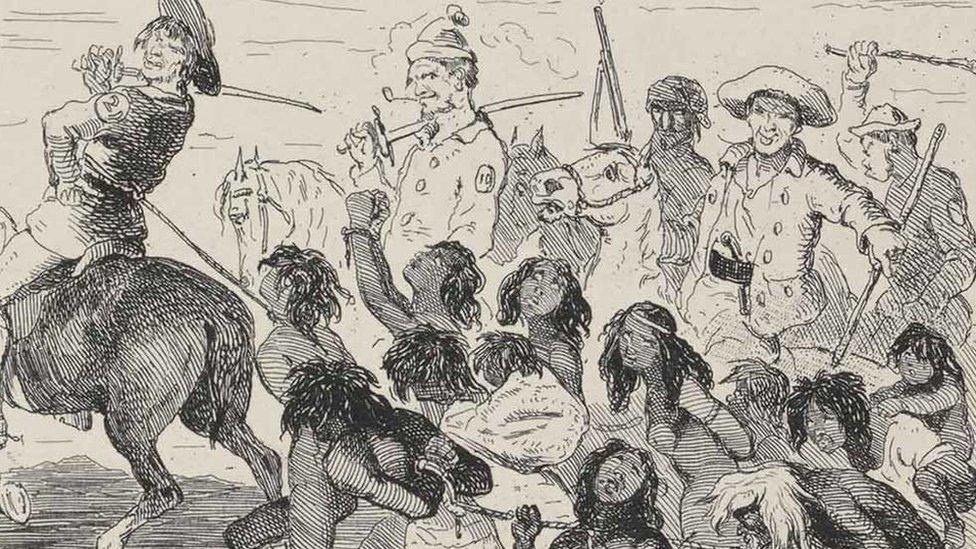Myall Creek: Newspaper makes historic apology for Aboriginal massacre reports
- Published

An illustration of the Myall Creek Massacre by English illustrator 'Phiz'
An Australian newspaper has offered a historic apology for its coverage of a massacre of Aboriginal people in 1838.
At least 28 people, mainly women and children, were brutally murdered in the New South Wales town of Myall Creek.
The massacre was the first - and only - time colonists were prosecuted for mass killings of Aboriginal people.
The Sydney Morning Herald (SMH) admitted to spreading racist views and misinformation while campaigning for the killers to escape justice.
The masthead, which is one of the nation's oldest publications, also opposed the death sentence eventually handed down to seven of the 12 men involved.
"This was not due to a lack of evidence or genuine doubts over the integrity of any legal process, but because the perpetrators were white and the dead black," the paper said in an editorial on Friday.
"The Herald has a long and proud history of telling the Australian story. But on Myall Creek, the truth is we failed dismally."
It also apologised for other historic articles which had encouraged readers to kill Aboriginal people if they ever felt "threatened", acknowledging its editorial positions had helped support the proposition colonists were "entitled to impunity" for their violence.
The editorial added that the masthead's coverage at the time was out of step with other papers, quoting a historian who deemed it "as brutal as colonial journalism gets".
The SMH said it was apologising on the 185th anniversary of the Myall Creek - on 10 June - because it felt "truth is an essential force for reconciliation".
The mass killings at Myall Creek Station were carried out by a group of European stockmen - mostly ex-convicts - who rounded up and executed Wirrayaraay women, children, and elders, while the men in their families were working nearby.
The events unfolded during Australia's Frontier Wars - a period of genocidal violence throughout the first 140 years of British settlement, when Indigenous people fought to defend themselves and their land from colonists.
In 2022, research from the University of Newcastle Australia found there had been 19 recorded genocidal massacres - defined as a series of reprisal massacres carried out by the same perpetrators in an effort to kill every Aboriginal person in a region.
The violence inflicted in Myall Creek that day is only known because the perpetrators were tried and convicted, historians say. Countless other atrocities from the Frontier Wars remain untold, leaving a gaping hole in Australia's history.
The SMH's apology is part of a broader reckoning taking place globally, as nations and powerful institutions grapple with histories of racial violence.
The Guardian recently apologised for its British founders' links to transatlantic slavery, while mastheads across the US - including the Baltimore Sun and Los Angeles Times - have asked for forgiveness over past failings on race reporting.